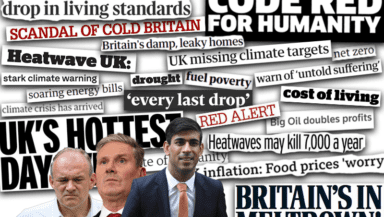A general election is just around the corner. The country has many urgent problems that need fixing. But climate change should be top of the political agenda.
Not only is taking action on climate change a huge vote winner in itself – it’s a powerful way to fix many of the problems facing the UK. Here’s why.
The solutions to the cost of living crisis are the same as the solutions to the climate crisis
The UK is suffering from multiple scandals, many related to high energy costs – the core of the cost of living crisis.
The next government must address all these scandals. But politicians will only commit to making changes when they realise how many votes are at stake.
Most people in the UK want the same things: lower cost of living, warmer homes, better and more affordable public transport and a strong NHS. What’s more, eight out of 10 people in the UK are concerned about climate change.
Tackling climate change will be a big job for the next government, which has committed to legally binding net zero targets. This will mean new ideas, plans and laws on housing, energy, health, jobs – benefitting pretty much the whole economy. Fortunately, the solutions to many of the UK’s problems are also solutions to the climate and nature crises. So a vote for better climate policy in the UK is also a vote for:
- Warmer homes
- Lower bills
- Better health
- More jobs
- A stronger economy
Warmer homes
The UK has the worst insulated homes in Europe. Almost two thirds of homes are badly insulated. Home heating is responsible for a fifth of the UK’s emissions that are causing climate change.
Rolling out a proper scheme for home insulation could reduce bills by on average £1000 every year.
And if the government supported renewable energy, instead of new oil and gas, bills would come down further. That’s because renewables are far cheaper than oil and gas. Onshore wind is the cheapest energy source in the UK.
Lower bills
Households now face seemingly never ending increases in bills, in part thanks to high energy costs. This is causing high inflation rates (the speed at which prices rise), making the cost of everything go up – bills, mortgages, rent, food. This is the cost of living crisis.
Many people’s wages haven’t been keeping up with these rising costs. Worker desperation has led to waves of strikes across the NHS, schools, universities, the fire service, UK public transport (which is already the most expensive in Europe) – the list goes on.
Support for homegrown renewable energy, rather than big oil and gas companies, would bring down bills for homes and businesses all over the UK.
Better health
The UK’s rivers and coastlines are filling up with sewage, making people sick. Five people a day contract disease from our water.
The air we breathe is dangerously polluted. Air pollution is killing between 28–36,000 people a year, and it’s the biggest risk to public health in the UK according to the government. But the UK also has the most expensive public transport in Europe. We need fewer petrol and diesel cars (and a switch to electric vehicles), and better and cheaper public transport.
Badly insulated homes are also a huge public health crisis. According to Citizen’s Advice, upgrading energy efficiency in homes (to standard EPC C) would prevent 670,000 children getting asthma, and prevent 6000 winter deaths per year.
And research shows that tackling cold homes would save the NHS £540 million per year.
More jobs
Acting on climate change would mean big public investments into renewable energy, insulation, and services like public transport. These also mean more jobs! Making buildings more energy efficient alone could mean 140,000 jobs by 2030, with hundreds of thousands more up for grabs in low-carbon industries.
It’s also important that there’s a just transition away from the difficult and dangerous jobs in North Sea oil and gas. But many of the skills are transferable, so these workers could be quickly retrained to work in sectors like offshore wind.
A stronger economy
The current government is dishing out new oil and gas licences, using taxpayer money to help oil and gas companies to keep drilling and polluting. It’s been actively blocking some renewables – like solar and onshore wind.
The UK has world leading offshore wind power. With support for other renewables, our economy would flourish.
And again, a government lacking a plan for home energy saving measures isn’t just keeping our bills high and our homes cold – it’s holding our economy back. Greenpeace estimates that insulating homes and installing heat pumps could boost the UK economy by £7bn a year.
Finally, climate change risks pose huge costs to the UK – and the global economy, which the UK depends on. As one of the largest historial emitters of carbon, the UK has a responsibility to the rest of the world (and its own people) to take strong climate action.
A general election is coming. It’s time to build a climate majority.
Climate action is a vote winner, but too many politicians still don’t understand this. So we’re going to show them that they need to prioritise what people want, or risk losing the next election.
Over the next year, we’ll work with people across the UK to show politicians that tackling climate change is a priority for millions of us.
And if we get it right, it’ll spark a ‘race to the top’ among the major parties, who’ll know they need strong climate and nature policies to sell to voters.
Building on our decades of work mobilising the public to support climate action, we’re launching Project Climate Vote. Street by street, town by town, we’re going to recruit over a million Climate Voters through a mass door-knocking programme and other channels.
Thousands of people are already getting involved, with packed-out welcome calls, and training events in Wales, Scotland, Northern Ireland, the South West, the South East, London, the Midlands and the North.



